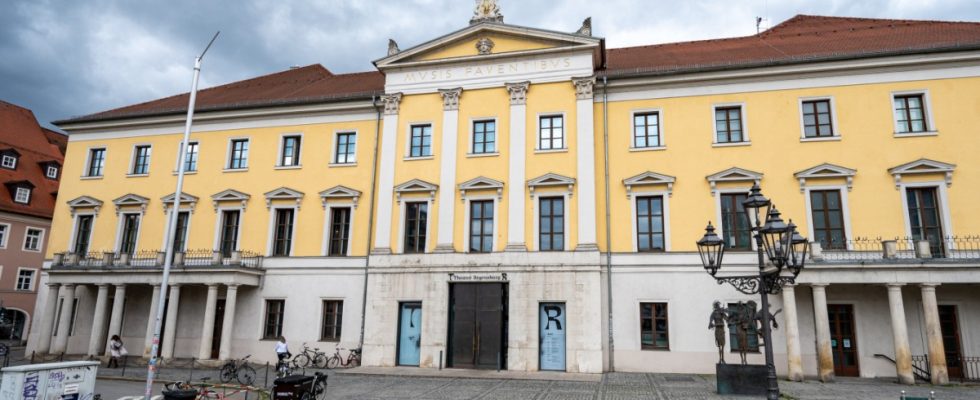The Bismarckplatz is a constant in the cultural life of the city of Regensburg. As soon as it no longer freezes at night, the young and the young at heart meet here, sit on the stone steps to the House of Music, on the stone edges of the two large fountains or simply directly on the cobblestones. Yes, there are more convenient places in Regensburg. The city park, for example, you could at least make a bed there on grass.
But then you would have a much worse supply of cold drinks and the view at Bismarckplatz is definitely worth getting a herniated disc. While your buttocks gradually fall asleep on the hard ground, you can enjoy the view of the magnificent classical building of the Stadttheater. In summer, when there’s a town festival or a jazz weekend or another street festival, of which there are many in Regensburg, there are beer benches everywhere.
Beer, nightlife, music and architecture are really well taken care of in Regensburg. You only have to stroll to Bismarckplatz. However, culture is not available for free in Regensburg either. Not the beer anyway, and then you don’t just want to see the theater, you might want to go in there too. The people of Regensburg are considered crazy about the theatre, the house registers around 180,000 guests at around 700 performances a year in the five categories of music theatre, drama, dance, young theater and concerts.
More money doesn’t hurt in the slightest. And so the cultural center of Regensburg was parked up on Thursday afternoon by a few expensive limousines with Munich license plates. Police officers and security staff checked entrances and exits. The political prominence from the state capital was finally approaching. Art Minister Markus Blume was announced to provide information about the “future of the Regensburg Theater”, as the press invitation cryptically stated. Finance Minister Albert Füracker was also invited. And then Markus Söder (all CSU). By then at the latest, even the biggest cultural philistine should have realized what rumors had been circulating for a few months: that the theater in Regensburg would be elevated to the state theatre. And of course that’s how it happened.
Appropriately, an actress pondered the fact that one cannot live on fame alone. In the best-case scenario, every theater box would have a millionaire. “My commercial heart is also particularly interested in what else this afternoon could bring,” said the theater’s commercial director, Matthias Schloderer.
Sitting on the stage in six white leather designer armchairs and introduced by brass fanfares, the gentlemen informed the public together with Regensburg’s mayor Gertrud Maltz-Schwarzfischer (SPD) and artistic director Sebastian Ritschel. “Regensburg will be a state theatre,” announced the prime minister. This makes Regensburg the sixth of its kind in Bavaria. “There was no state theater in East Bavaria,” said Söder.
Füracker, from the Upper Palatinate and self-declared “bean counter”, then outlined Regensburg as a place that is now practically reaching perfection. “The last dream that one still has in Regensburg has come true. Now we have brought complete happiness. Christmas and Easter fall on the same day. This is a special event for the Upper Palatinate.” And there is money too.
“The Revisor” is the title of a current production at the Regensburg Theater, which will soon be able to call itself the Regensburg State Theater.
(Photo: Tom Neumeier Leather)
So far, the theater has been financed as an independent municipal company for the most part by the city of Regensburg. If a house becomes a state theatre, the Free State takes over 50 percent of the funding for the theater business. The budget, which comes from the Free State, is now to be increased step by step. On the one hand, the additional money is intended to compensate for rising personnel and energy costs. Of course, the quality should also increase with the title State Theater. But everyone agrees that it is already outstanding. “It’s also an appreciation, a recognition. Like an Oscar,” said Söder. “State theater is in a league of its own. And Regensburg has qualified for this league,” said Minister of the Arts Blume. Both politicians admitted in the subsequent round of questions that their first visit to the Regensburg Theater was still pending – and should take place very quickly.
The news of the rise to the rank of a state theater is not inconvenient, not only because of the expected rain of money. The debut of the new director, Sebastian Ritschel, was a bit bumpy. He said that 40 employees in all departments of the theater would not be extended. This is the industry’s euphemistic term for dismissal. The contracts of the employees are usually issued for the period of an artistic directorship. When this ends, they are often not renewed. That’s legally correct in the theater world, and it’s also common. A director not only brings his artistic vision with him, but usually also the staff he has in mind for its implementation. Putting 40 people out at once caused dismay given the size of the house in Regensburg.
Especially since Ritschel’s predecessor Jens Neundorff von Enzberg had an excellent reputation – in the city and beyond. Some critics and passionate theatergoers even claim that Regensburg owes its rise to the rank of state theater above all to him.
The anger about the change of director should finally disappear with the state theater becoming. In any case, the mayor is “very happy”, but now has to go to a meeting. “Unfortunately, the gentlemen have to go on too, otherwise we could be having a party now,” said Maltz-Schwarzfischer at the end. The party might have been organized by the people of Regensburg. Outside the door on Bismarckplatz, the culture of sitting around began in the evening sun – now with a view of a state theatre.

